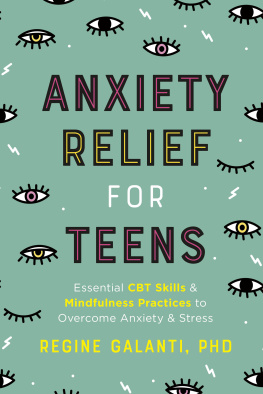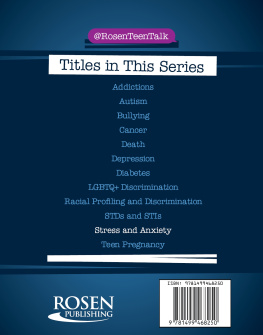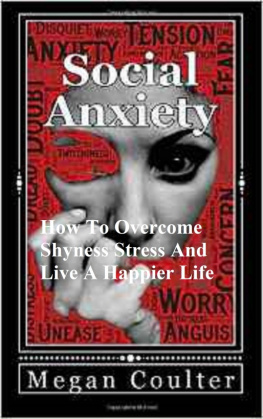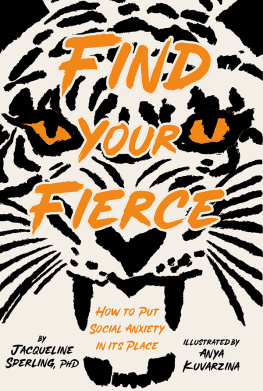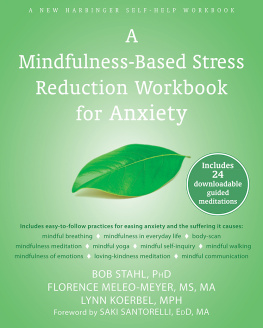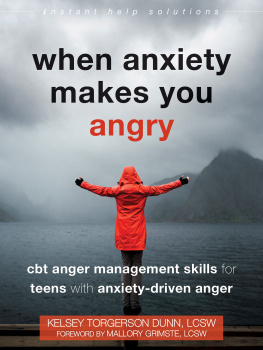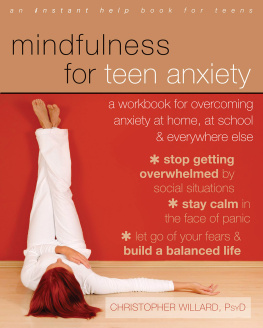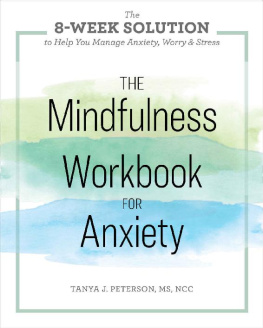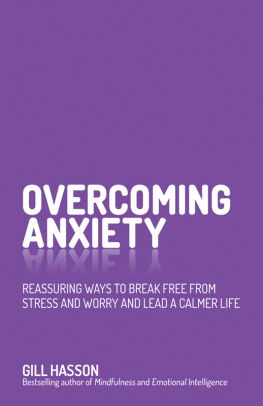ACKNOWLEDGMENTS
To my girlsSarah, for your excellent and attentive proofreading and advice; Emma and Hannah, for putting up with me while I wrote and wrote. I love you all and hope you grow up to be wonderful, strong women with solid anxiety management skills. To Yosef, thank you for your moral support, household management, and 11 years of teamwork that allowed me to take on this project during an already busy year in our lives.
To Tonya Swartzendruber, thank you for introducing me to mindfulness and helping me with that chapter. Thank you to my CBT support network for your help with metaphors, skills, and training.
Finally, to my editor Meg Ilascothank you for finding me on Twitter and trusting me with this project. This has been a wonderful opportunity to use my therapy skills in a different way, and Im truly grateful.
ABOUT THE AUTHOR
REGINE GALANTI, PHD, is a licensed psychologist who focuses on treating children and teens with anxiety. She specializes in cognitive behavioral therapy (CBT) and has expertise in obsessive-compulsive disorder, anxiety, parenting, and behavior problems. She is the founder of Long Island Behavioral Psychology in Long Island, New York, where she brings warmth, sensitivity, and a tailored problem-solving approach to her practice.
As a clinical psychologist, Dr. Galanti applies short-term, evidence-based strategies to help young people change their thoughts and behaviors. Specifically, she uses exposure and related behavioral therapy techniques to help those living with anxiety face their fears so they can live happier, healthier lives.
Website: www.longislandbehavioral.com
Twitter: @reginegalanti
TikTok: @dr.galanti
CONCLUSION
Living perfectly is an impossible goal. Youre human and will experience normal human emotions, including anxiety, and some days will be better than others. Hopefully this book has showed you a different way of relating with your anxiety so you are better able to manage it as it arises, and bounce back a little faster when the days do get bad. As uncomfortable as it might feel sometimes (both physically and emotionally), your anxiety is part of who you are. So dont try to avoid, erase, or escape it. Your goal is to be more self-aware and accepting of difficult emotions. Only in this way can you see that just like those leaves on the river, even the most negative feelings eventually pass.
Remember that no single strategy will work for everyone. This book has presented a variety of tools and exercises so you can turn to different ones in different anxiety-inducing situations. If youre lists suggestions for further reading, useful phone apps, and informative websites.
Know that progress hardly ever moves in a straight line. Even if youre committed to overcoming your anxiety, you might find yourself falling back into old habits sometimes. Thats OK. You can always reread sections of this book that you found helpful and continue using the techniques youve learned. I know its a downer to tell you that youre probably going to fail at some point, but everyone fails. Just be kind to yourself, keep practicing, and celebrate even the small steps!
APPENDIX
ACTION PLANS
The best way to use this book is to commit to a plan of action. Plans dont need to be elaborate to be effective. This is an opportunity to manage stress, not create more! Even if you feel ready for more, try to avoid packing too much in at once. Many of these strategies need time to become habits, and taking a step-by-step approach is the best way to make these new skills a part of your routine.
Below are some sample programs. Feel free to follow these or create your own. The idea is to slowly build yourself a toolkit of various coping skills you can use together or separately at different moments. To do this, practice each skill on its own for a week. Add a new skill the following week, and then practice the new one and the old one together. For example, start with tracking for a week. Then introduce a mindfulness exercise the second week, a healthy thinking exercise the third week, and so on. It typically takes between six weeks and six months to build up to a full anxiety management program.
Note that Track Your Anxiety ( ) are the foundation of any anxiety plan. You cant manage what you cant name. Use these steps to become more aware of your anxiety.
GENERALIZED ANXIETY
Develop a self-care routine: Set up a regular bedtime, and aim to exercise for at least 30 minutes three times a week.
Pick a mindfulness exercise to practice daily. If youre having trouble sleeping, try it before bed.
Practice healthy thinking skills twice a week by labeling any thinking traps and identifying coping thoughts.
Use opposite action daily for anxiety-provoking situations.
Identify opportunities to do exposure once a week.
Identify your go-to coping strategy. For example, carry around coping cards.
SOCIAL ANXIETY & SEPARATION ANXIETY
Practice your go-to strategy for managing your negative thoughts four times a week.
Practice mindfulness three times a week to reduce your baseline anxiety levels.
Find pleasurable activities that you can engage in while youre in a social situation that makes you anxious. For example, if youre afraid of hanging out with large groups but you love ice-skating, skate in a crowd.
Use exposure exercises to face a feared situation every day.
Identify your go-to coping strategy. For example, carry around coping cards.
PHOBIAS
Identify your thinking traps and coping statements you can use to face your phobia.
Focus on exposure strategies by developing a fear ladder. The more often you can face your fear, the better. You can gradually build up to your core fear, or do longer exposure sessions to see quicker results.
Identify the coping strategies that work for you in the moment when you feel anxious.
PANIC ATTACKS
Use the Coping with Panic Attacks plan on .
Practice mindfulness five times a week to reduce your baseline levels of anxiety.
Make sure to focus on your own self-care. Think about your sleep, diet, and exercise routine. This is especially true for calming physical symptoms.
Engage in activities you value three times a week to reduce your baseline anxiety.
OBSESSIVE-COMPULSIVE DISORDER (OCD)
Track your obsessive anxious thoughts and compulsions ( ) daily for a week.
Use this tracking information to create a fear ladder for your compulsions.
Identify your thinking traps and come up with coping statements for them that you can use twice a week.
The best treatment for OCD is exposure, exposure, exposure! Do exposure exercises every day. Use your fear ladder.
Develop a self-care routine that includes pleasurable activities and exercise.
Stress makes OCD symptoms worse, so find a mindfulness exercise that works for you and practice it five times a week.

